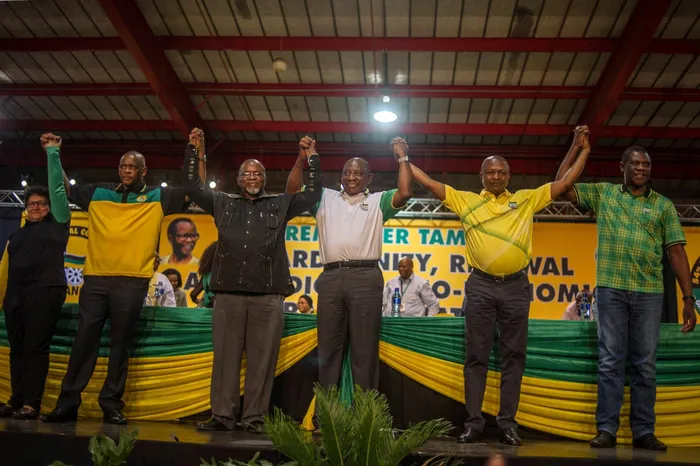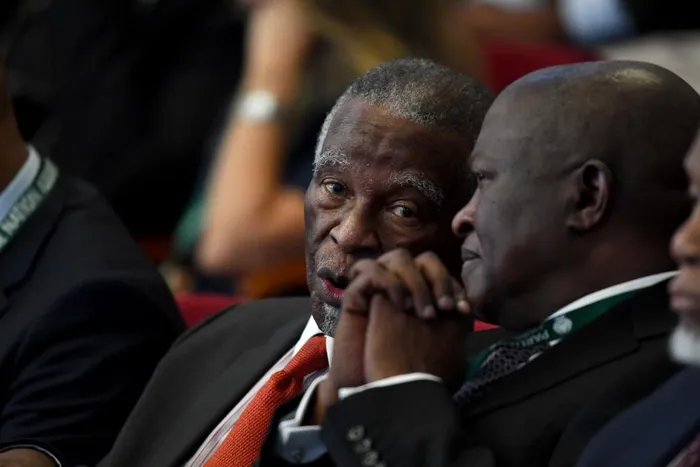David Dabede ‘DD’ Mabuza: A Master Tactician Who Navigated SA's Brutal Political Terrain

The African National Congress top six elected at the party's 54th National Conference at the at NASREC Expo Centre on December 18, 2017, (from left) Deputy Secretary-General Jessie Duarte, Secretary-General Ace Magashule, National Chairperson Gwede Mantashe, President Cyril Ramaphosa, Deputy President David Mabuza and Treasurer-General Paul Mashatile.
Image: AFP
Reneva Fourie
David Dabede ‘DD’ Mabuza passed away in Johannesburg on 3 July 2025, at the age of 64. Quiet yet formidable, Mabuza’s journey from rural Mpumalanga to national power was as improbable as it was compelling.
Mabuza’s political career was one of remarkable resilience, calculated manoeuvring, and a reputation for feline-like cunning that earned him the nickname ‘The Cat’. Through shrewd calculations, alliance-building, and opportunistic shifts, he not only secured provincial supremacy but also played a decisive role in the national political realignment that led to Cyril Ramaphosa’s rise to presidency in 2017.
Mabuza’s political life began in earnest after his years as a teacher and school principal. Having served in the South African Democratic Teachers’ Union, he joined the ANC after its unbanning in 1990. By skilfully navigating factional terrain, he climbed the ranks of the ANC and provincial government through a mixture of administrative competence and careful alliance-building. His stints as MEC for several departments, ranging from Education to Agriculture, provided him with the practical experience to understand how power operates and how it can be directed strategically.
When the opportunity arose to challenge Thabang Makwetla for the ANC provincial chairpersonship in Mpumalanga in 2008, he struck with the precision of a predator that had stalked its prey quietly and patiently. His victory opened the door to the Mpumalanga premiership, a position he would hold from 2009 until his breakthrough to national ranks.
Mabuza did not merely inherit a power base in Mpumalanga; he built one. He expanded the provincial ANC’s delegate count to the national conferences, dramatically increasing its influence within the party. By 2017, Mpumalanga had the second-largest number of voting delegates, after KwaZulu-Natal. This wasn’t an administrative coincidence. It was part of a long-term strategy that would later pay off in one of the most consequential internal power shifts in ANC history. Mabuza had effectively turned Mpumalanga into a political battering ram ready to be unleashed at a moment of his choosing.
Mabuza’s grip on Mpumalanga extended beyond the ANC into its alliance partners, including the South African Communist Party. Once viewed as a ruthless figure linked to the 2015 SACP Joe Slovo lecture attack in KaNyamazane, he stunned observers by publicly apologising to SACP leader Bonakele Majuba, embracing him in a rare show of contrition. By reconciling with purged and alienated comrades, he rebranded himself not only as a unifier but as a shrewd tactician who understood that soft power could cement hard control.

Former president Thabo Mbeki (left) in conversation with former deputy president David Mabuza at the Cape Town City Hall on February 6, 2025 ahead of the 2025 State of the Nation. Mabuza lived politics as a game of angles and timing. In an environment where loyalty is fleeting and principles are flexible, he showed that adaptability, patience, and the ability to stay unseen were political virtues, says the writer.
Image: AFP
Despite his successes, controversy clung to him. His name surfaced repeatedly in connection with corruption and political violence. An alleged theft of R14 million from his farm in 2009 added to the air of suspicion. Whisper networks spoke of silenced critics and punished whistleblowers. Yet nothing stuck. He was never formally charged. To detractors, he was a dangerous operator in a dirty game. To loyalists, he was simply a realist navigating a brutal political terrain.
No episode captured his tactical brilliance better than the ANC’s 54th National Conference in December 2017. The race between Cyril Ramaphosa and Nkosazana Dlamini-Zuma was too close to call. For months, Mabuza appeared to back Dlamini-Zuma. His association with the Zuma/ ‘Radical Economic Transformation (RET)’ camp seemed obvious given the geographic and factional proximity of Mpumalanga and KwaZulu-Natal. Then, at the last moment, he flipped. He swung Mpumalanga’s delegate bloc to Ramaphosa, securing him the position of president.
Mabuza was elected to the position of deputy president of the ANC and was subsequently appointed as the country’s deputy president two months later. The move was audacious. It redirected the party from its Zuma-era deepening unpopularity. Some called it betrayal. Others saw it as foresight. What cannot be disputed is that it was decisive. Mabuza waited, watched, and moved only when it mattered most.
As deputy president from 2018 to 2023, Mabuza remained largely out of the public eye. His speeches were sparse and tightly controlled. Yet within the ANC, he remained a behind-the-scenes negotiator and a quiet steadying force in building the organisation. He knew how to hold influence without spectacle.
In 2023, citing health concerns, Mabuza stepped down. It was a silent exit from formal leadership, fitting for someone who had always preferred to operate from the shadows. Still, he returned in 2024 to campaign for the ANC in yet another bruising election.
Now, with his passing, South African politics loses a man who embodied its contradictions. He was both a machine man and a reformer. A unifier and a divider. A man of cunning more than conviction. Mabuza never sought to change the system. He studied it, understood it, and outplayed it. He moved through it like a predator in tall grass, striking only when the odds were perfect.
To his admirers, he was the master tactician who helped stabilise the ANC at a moment of existential crisis. To his critics, he was a symbol of everything corrosive in the country’s politics – a man whose rise relied on silence, fear, and ruthless pragmatism. But to all, he was significant. He was no pawn. He played the board like a grandmaster, shifting from pawn to bishop to queen when required.
David Mabuza lived politics as a game of angles and timing. In an environment where loyalty is fleeting and principles are flexible, he showed that adaptability, patience, and the ability to stay unseen were political virtues. He moved when others hesitated. He retreated when others charged blindly. He struck when the moment demanded impact.
In the end, the man known as The Cat ran out of lives. But the imprint he leaves behind is undeniable. His was a career not of speeches and slogans but of deals and decisions, often made in rooms that will never be revealed. And that, perhaps, was his most enduring lesson: power lies not in noise but in knowledge, in timing, and in the quiet mastery of every move.
* Dr Reneva Fourie is a policy analyst specialising in governance, development and security.
** The views expressed do not necessarily reflect the views of IOL, Independent Media or The African.